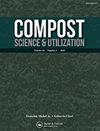Labile Carbon Affects Fecundity of Omodeoscolex divergens and Eudrilus eugeniae under Pure and Mixed Culture Vermicomposting
IF 0.9
4区 农林科学
Q3 ECOLOGY
引用次数: 0
Abstract
Abstract Detergent fiber analysis was used to fractionate carbon (C) into hemicellulose (degradable carbon) and cellulose and lignin (recalcitrant carbon) for cattle manure (CM), neem leaves (NL), corn stover (CS), and lawn clipping (LC) to investigate the effects of C quality on vermicomposting. A factorial design having five C sources (CM, CM + NL, CS, CS + NL, and LC) and two earthworm species (Eudrilus eugeniae (EE) and Omodeoscolex divergens (OD)) was studied under pure and mixed culture vermicomposting. Earthworm fecundity, biomass, and vermicompost quality were measured. The combination of culture and C source was significant (p < 0.05) for all fecundity and biomass variables. CM and CM + NL were mainly associated with increased responses. Change in population was > tenfold for EE and OD reared on CM. Percentage change in biomass increased up to 200% for OD and EE when fed CM and CM + NL. Contrastingly, decreases or no changes in fecundity and biomass parameters were associated with CS and CS + NL. The NL combinations resulted in lower responses in fecundity and biomass; however, earthworms favored CM + NL over CS + NL. OD was highest (p < 0.05) amongst cultures for LC. The mixed culture response was generally low for parameters measured. Vermicompost C/N ratio decreased from initial carbon source values except for LC. O. divergens vermi-converted carbon sources of varying C quality, producing distinct vermicompost in the process.纯蚯蚓堆肥和混合蚯蚓堆肥条件下,不稳定碳对分化单孢菌和真丝线虫繁殖力的影响
摘要采用洗涤纤维分析方法,将牛粪(CM)、楝叶(NL)、玉米秸秆(CS)和草坪修剪(LC)中的碳(C)分馏为半纤维素(可降解碳)和纤维素和木质素(难降解碳),研究C品质对蚯蚓堆肥的影响。采用纯蚯蚓堆肥和混合蚯蚓堆肥两种蚯蚓(Eudrilus eugenae (EE)和Omodeoscolex divergens (OD)),对5种C源(CM、CM + NL、CS、CS + NL和LC)进行了因子设计。测定了蚯蚓的繁殖力、生物量和蚯蚓堆肥质量。培养物和C源的组合对CM上饲养的EE和OD有显著的影响(p 10倍)。饲喂CM和CM + NL时,OD和EE的生物量变化百分比增加了200%。相比之下,CS和CS + NL的繁殖力和生物量参数降低或没有变化。NL组合对繁殖力和生物量的响应较低;然而,蚯蚓更喜欢CM + NL而不是CS + NL。各培养物中以LC的OD最高(p < 0.05)。混合培养对所测参数的响应一般较低。除LC外,蚯蚓堆肥C/N比较初始碳源值有所下降。不同碳质量的蚯蚓转化碳源,在此过程中产生不同的蚯蚓堆肥。
本文章由计算机程序翻译,如有差异,请以英文原文为准。
求助全文
约1分钟内获得全文
求助全文
来源期刊

Compost Science & Utilization
农林科学-生态学
CiteScore
4.10
自引率
0.00%
发文量
0
审稿时长
>36 weeks
期刊介绍:
4 issues per year
Compost Science & Utilization is currently abstracted/indexed in: CABI Agriculture & Environment Abstracts, CSA Biotechnology and Environmental Engineering Abstracts, EBSCOhost Abstracts, Elsevier Compendex and GEOBASE Abstracts, PubMed, ProQuest Science Abstracts, and Thomson Reuters Biological Abstracts and Science Citation Index
 求助内容:
求助内容: 应助结果提醒方式:
应助结果提醒方式:


